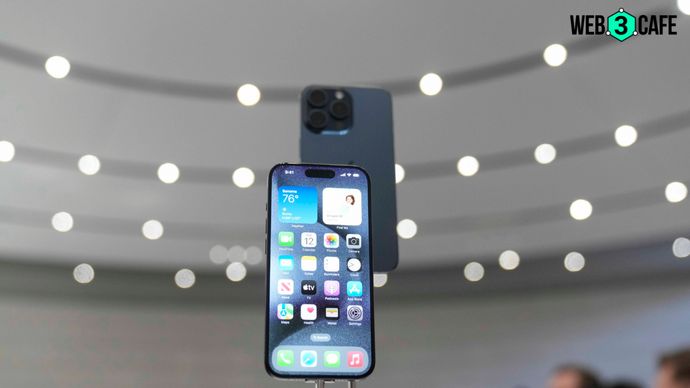Apple's stunning titanium-finish iPhone 15 launched, pledges carbon-neutrality by 2030
iPhone 15 Pro & iPhone 15 Pro Max use recycled rare Earth elements in magnets, recycled gold in USB‑C, and recycled materials in circuit boards, echoing Apple's eco-friendly stance and sustainability goals

Highlights
- Apple introduces the iPhone 15 Pro, featuring aerospace-grade titanium construction, the lightest Pro model to date
- Both iPhone 15 Pro and iPhone 15 Pro Max incorporate groundbreaking eco-friendly practices
- Apple's sustainability drive extends to packaging with over 99% fiber-based materials, aiming to eliminate plastic by 2025
- Apple also face challenges in the Chinese market as it is imposing more restrictions on the use of iPhones
Apple made waves on 12 September with the grand reveal of its latest iPhone lineup - the iPhone 15 and iPhone 15 Pro. These new phones pack cutting-edge technology and were showcased during the exciting Wonderlust event held at Apple's headquarters in Cupertino, California.
The iPhone 15 and iPhone 15 Pro come with a host of improvements. These include brighter displays for vivid visuals and a powerful 48-megapixel wide-angle camera for stunning photos. But that's not all; Apple has gone the extra mile in terms of design and materials.
The iPhone 15 Pro boasts a sleek design, with aerospace-grade titanium. This material is not only strong but also incredibly lightweight, making it the lightest Pro model Apple has ever created. The revamped design features contoured edges for a comfortable grip.
Apple's Green Mission: Carbon neutrality by 2030
Apple is on a mission to be environmentally responsible. The tech giant has set a goal to achieve carbon neutrality across its entire supply chain by 2030. This means that every step, from designing products to making them, delivering them to customers, and even their use, will be eco-friendly.
By 2030, all Apple devices will have a net zero climate impact
To reach its carbon neutrality goal, Apple is focusing on using recycled and low-carbon materials in its products. Notably, the iPhone 15 Pro and iPhone 15 Pro Max are making strides in this direction.
According to Octavia Spencer (played role of Mother Nature in Apple’s video), said,
We have a profound opportunity to build a more sustainable future for the planet we share
Breaking new ground with recycled materials
These models feature a 100 percent recycled aluminum substructure, a significant step forward in sustainable design. Additionally, the batteries contain fully-recycled cobalt, marking a pioneering achievement for Apple's commitment to sustainability.
Eco-friendly innovations extend to accessories
Apple's dedication to eco-friendliness doesn't stop at the phones themselves. Both models incorporate fully-recycled rare earth elements in magnets and recycled gold in the USB‑C connector.
They also utilise recycled materials in gold plating and tin soldering in multiple printed circuit boards, aligning with Apple's energy-efficient practices. Importantly, these materials are free of harmful substances like mercury, PVC, and beryllium.
Reducing plastic waste and leather usage
Apple is also making strides in packaging. Over 99 percent of their packaging materials are now fiber-based, taking them one step closer to their goal of eliminating plastic from packaging by 2025.
Moreover, Apple has committed to no longer using leather in any of its products, including iPhone accessories, as part of its ongoing efforts to minimise its environmental impact. Apple's latest iPhone offerings not only promise cutting-edge technology but also showcase the company's dedication to sustainability and responsible environmental practices.
Apple battling with Huawei
Apple is currently dealing with challenges in the Chinese market. The Chinese government is placing more restrictions on the use of iPhones in government offices, causing obstacles for Apple. Additionally, competition from Huawei Technologies' latest flagship phone is affecting the demand for Apple iPhones in China.
It's noteworthy that Huawei recently boosted its goal for the Mate 60 series smartphone shipments for the second half of the year by 20 percent. On 12 September, just before Apple's announcement, China's Securities Times reported on this development.
